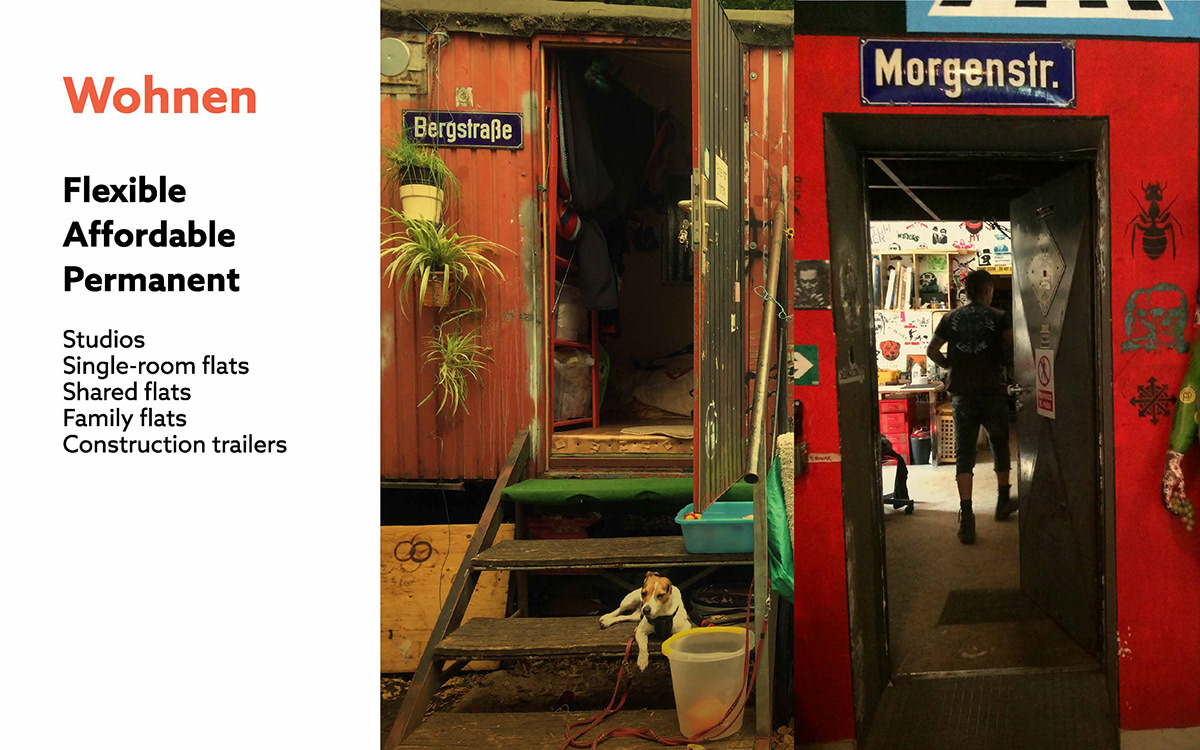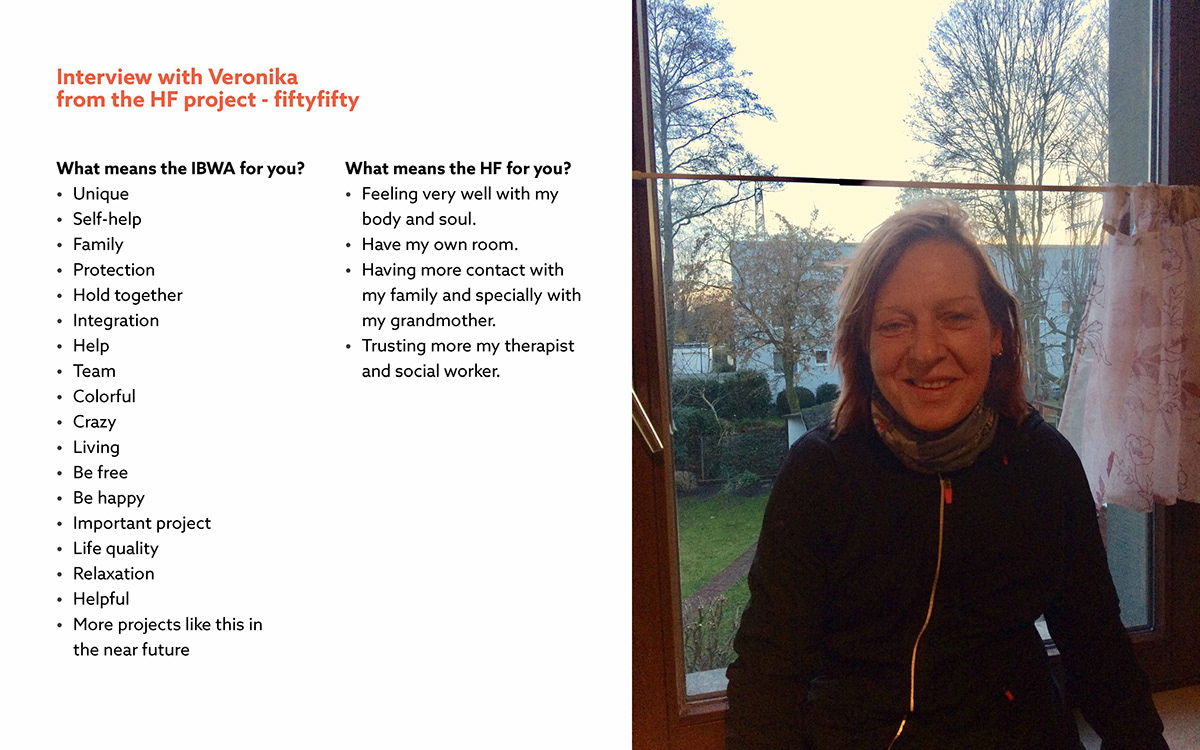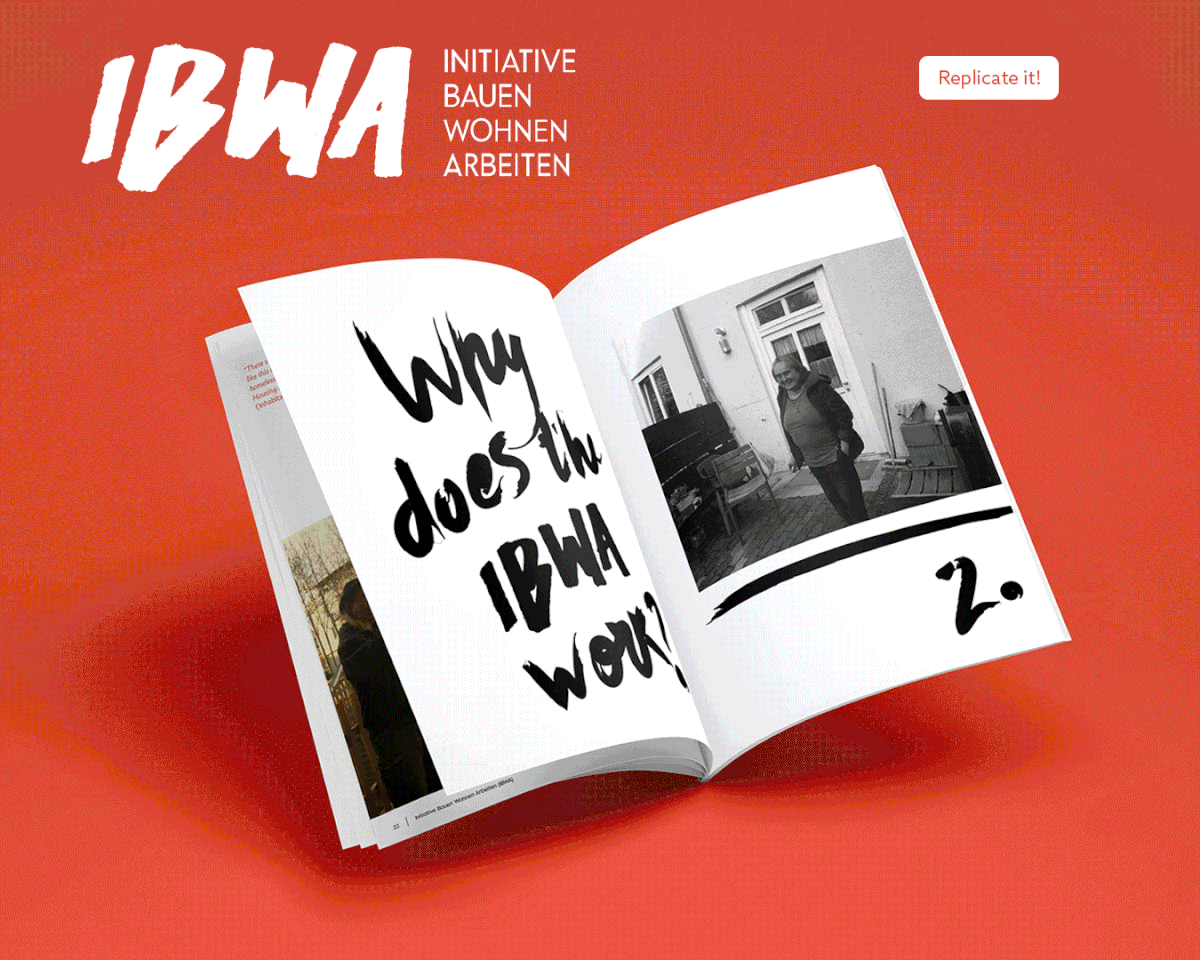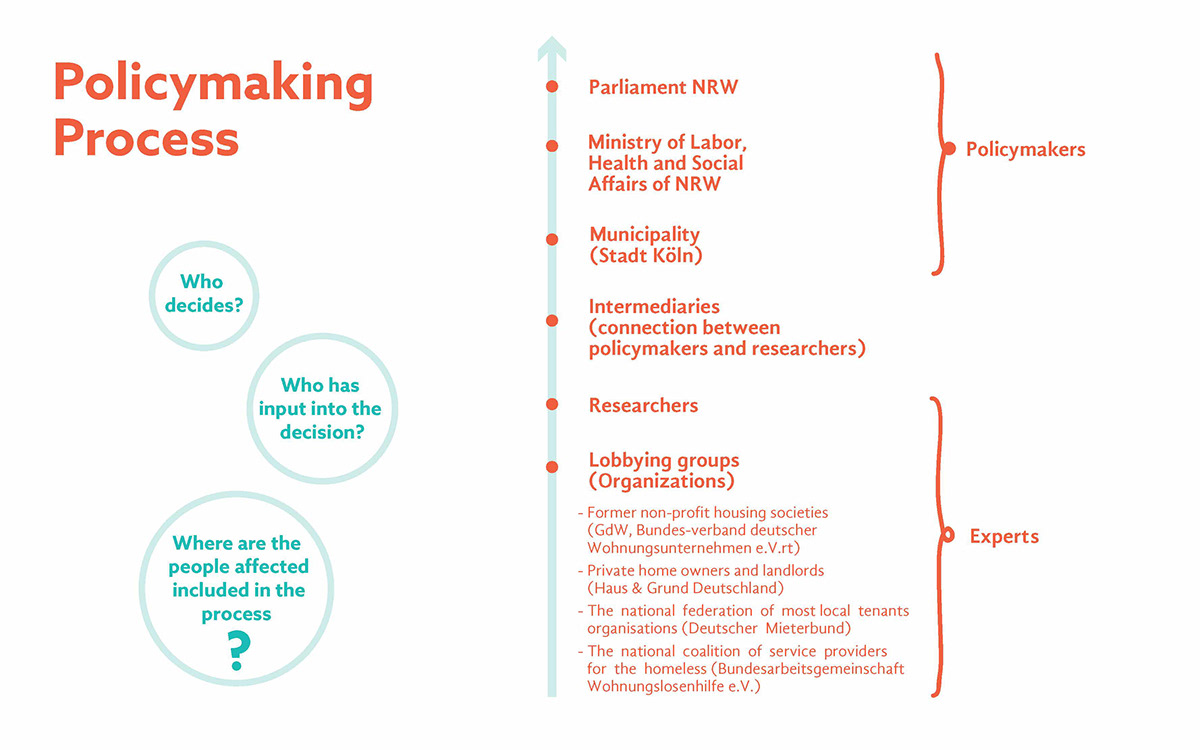Designing housing solutions
by, with, and for homeless citizens
by, with, and for homeless citizens
- Homelessness from a Service Design and Systemic perspective -
The active role of homeless citizens in Germany. The case of the Initiative Bauen Wohnen Arbeiten in Cologne
Countless organizations are working in the homeless sector; nevertheless, Germany has 1.2 million citizens living this reality every day. Solutions normally range from emergency charity services to quick-fixes, such as temporary accommodation.
My thesis work was based on:
1) recognizing housing as a human right and the starting point for ending homelessness, not the ending goal; and
2) that permanent fixes can only be achieved by practicing a human-centered approach and including "experts by experience" (people with lived homelessness experience) as active actors in the development of solutions.
When facing a systemic issue as it is homelessness, there is a need for interventions at multiple levels from individually-focused solutions to large-scale social policies. Thus, the outcome of this thesis contemplated on the first hand, the construction of an IBWA model easy to replicate, based on the "Initiative Bauen Wohnen Arbeiten" in Cologne (in English Initiative Building, Living, Working). And last but not least, a set of Principles developed by and with the "Self-representation of homeless people" to guide the collaboration hand by hand between service providers, policymakers and homeless citizens.
SERVICE DESIGN - SYSTEMS THINKING - USER RESEARCH -
MISSION MODEL DESIGN - POLICY INFLUENCING - CO-CREATION
MISSION MODEL DESIGN - POLICY INFLUENCING - CO-CREATION

How do we start mapping homelessness?
Where do we start? Who are the actors?
Where do we start? Who are the actors?
Which are causes? Which are consequences?
Is it a personal or a systemic issue?


The research was guided by 2 main questions:
Both questions are intimately connected. While the 1st one is focused on the particular practice of a permanent housing service started by, worked with and for homeless citizens; the 2nd one is a zoom-out on the whole systemic issue with the aim of speculating about the potential active role of the homeless community in large-scale policymaking housing processes.


1st. Research Question

What is the IBWA (Initiative Bauen Wohnen Arbeiten)?





With more than 20 years of existence, the question is:
Why are there no more Initiatives like the IBWA in Cologne or in Germany?
The answer could be found doing a parallel with the already existent and many times implemented "Housing First model". This model means a paradigm shift in the fight against homelessness, offering permanent housing as a starting point rather than an ending goal having chronic homeless citizens as a target group.
The IBWA shares this same and very important principle, moreover goes some steps further (more information about this could be found in the booklet to replicate the IBWA Model). Main barriers to the replication of the IBWA until now were the lack of assessment and the lack of a model that could allow its replication in Cologne, North Rhine-Westphalia or Germany.

Design process
It was divided in 3 main phases:
1. IBWA service quality check
2. Systematization of the IBWA in a replicable model
3. Speculative interviews at systemic level (this phase was also part of the 2nd research question)
2. Systematization of the IBWA in a replicable model
3. Speculative interviews at systemic level (this phase was also part of the 2nd research question)




Co-creation workshop with inhabitants of the IBWA in Cologne.

Workshop conclusions: organization of the insights and results before creating the model.

Research conclusions:
Parallel of the qualitative and quantitative data of the Housing First model and the IBWA.
Parallel of the qualitative and quantitative data of the Housing First model and the IBWA.

Outcome:
A booklet and a website compiling all the research and work in the construction of an IBWA model (in English Initiative Building, Living, Working) answering to:
- What is the "Initiative Bauen Wohnen Arbeiten" in Cologne
- How does it work
- Why do the inhabitants say it works
- How it can be replicated

2nd Research Question

Research
Mapping the policymaking actors, process and cycle.
Mapping the policymaking actors, process and cycle.

Goal
Bringing the 3 type of actors in the decision making processes regarding housing: the homeless community, experts, and policy makers.
Bringing the 3 type of actors in the decision making processes regarding housing: the homeless community, experts, and policy makers.

Process
How to do it?
How to do it?

Immersion at the Wohnungslosentreffen 2018 (Homeless people meeting 2018) organized by the "Self-representation of homeless people".

Interviews with the homeless community, social workers and politicians

Selected challenges and opportunities mentioned by the different actors:

After speculating with the different actors and in order to answer to the question How do we make this collaboration possible?
I sent a digital survey to the homeless community ("Self-representation of homeless people") asking them how do we eradicate homelessness? and dividing the content in 5 topics:
- Housing
- Emotional wellbeing
- Physical wellbeing
- Work
- Social reintegration

Outcome: Principles from the perspective of the homeless community
A set of Principles developed by and with the "Self-representation of homeless people" to guide the collaboration hand by hand between service providers, policymakers and homeless citizens in order to design services that end homelessness and stop managing it.

General Conclusions

This research aims to stop the romanticism and fatalism around the topic of homelessness and propose ways out of it from a systemic point of view. Showing a good practice of an already existent Initiative in the NRW region and recognizing the fundamental values that make the service work so well.
On the way of digging and collecting the information for the case study, it was evident that the reasons why this Initiative was successful exceed the physical structures and went more to the way the service is designed and how all the inhabitants and actors interact between each other. Applying Service Design and having a user-centered approach made it possible to go deeper into the research and put in evidence the core values of the Initiative Bauen Wohnen Arbeiten.
Having a holistic point of view of the situation, made it possible to zoom out and make an in-depth analysis of how the public sector works around this topic when making any decision regarding policies. Recognizing the actors involved and the gaps in the cycle where the homeless community could be of great help is also a proposal in the last chapter of the thesis. A way of impacting the whole policymaking process would be including experts by experience (people with homeless experiences) in the policymaking process not only in contact with the social scientists and researchers but sitting at the same table and being involved and collaborate with their knowledge. Ultimately, the homeless citizens are the final users of the services.
The goal of this thesis is to put in evidence the face of homelessness we are not used to see: participation, self-organization, self-help, and self-empowerment of homeless citizens
Master of Arts Integrated Design - 2019
Köln International School of Design (KISD)
Fields of expertise: Service Design, User Research, Systemic Design
Supervisors: Prof.Birgit Mager (Service Design) & Prof. Dr. Thomas Münch (Social & Cultural Studies)
Supported by: the “IBWA - Initiative Bauen Wohnen Arbeiten e.V.” and the “Selbstvertretung wohnungsloser Menschen.”
Supported by: the “IBWA - Initiative Bauen Wohnen Arbeiten e.V.” and the “Selbstvertretung wohnungsloser Menschen.”
Place: Cologne, Germany
Tags: Service Design, Qualitative research, quantitative research, homeless citizens, citizen participation, policymaking, policy influencing, social work, IBWA, Self-representation of homeless people, systems thinking, homelessness, mission model, human-centered approach, experts by experience.










